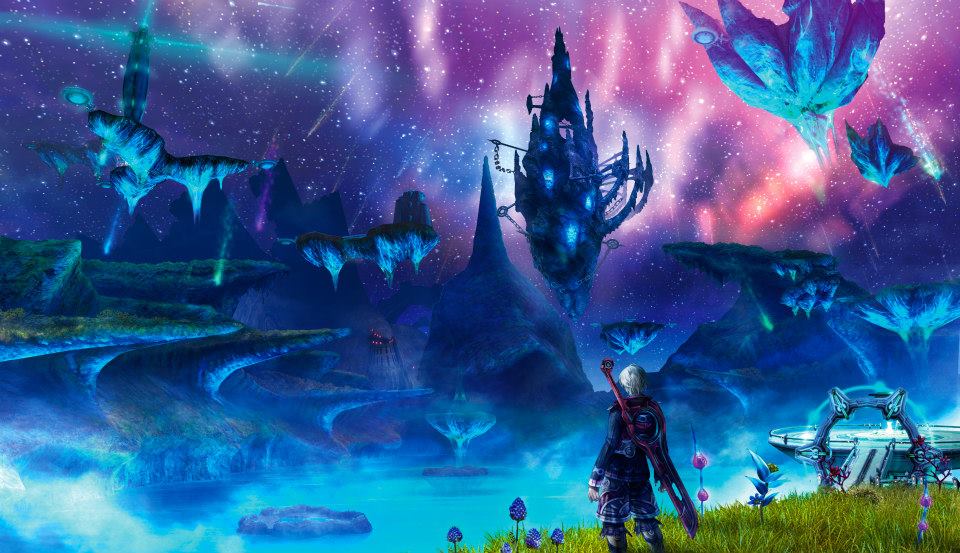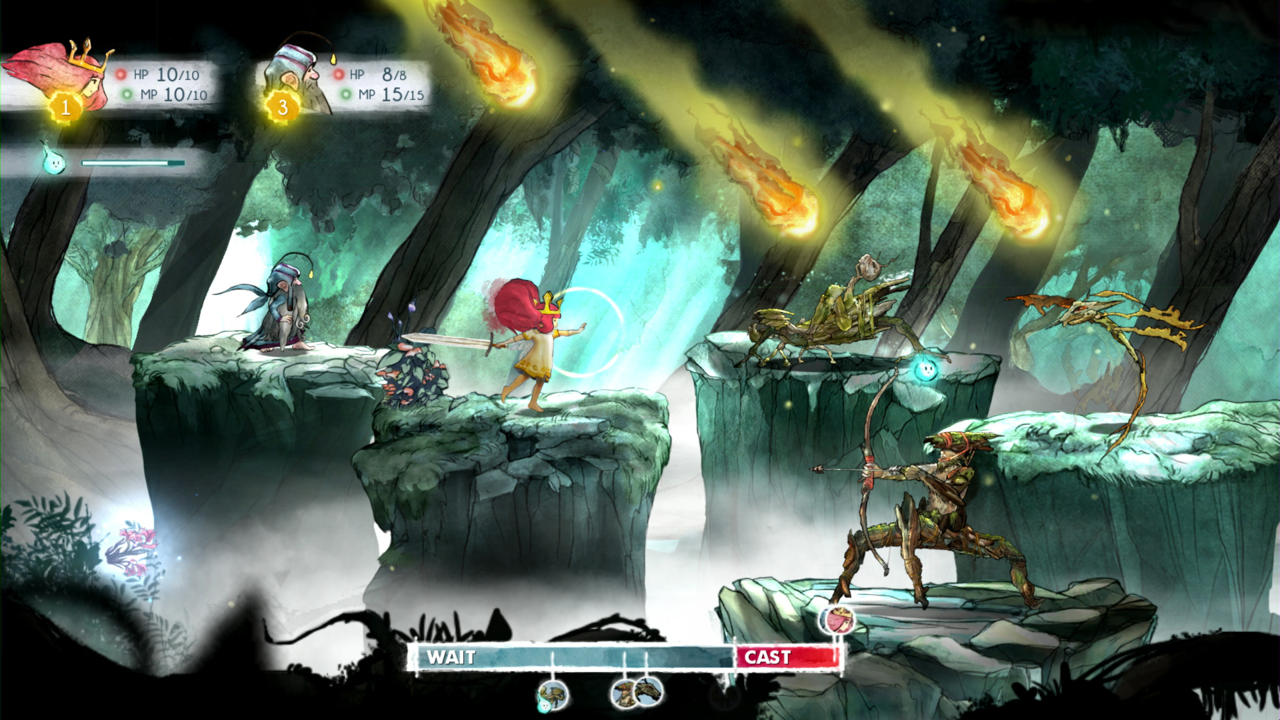"JRPG" has become a commonly used term to describe not just an RPG from Japan, but any RPG whose presentation mimics the design sensibilities of anime and manga. You could argue that there are also certain mechanics or design philosophies that put a game in the JRPG category, such as turn-based battles, but it's typically the presentation and character archetypes that signal "this is a JRPG." Is that surface level definition good enough when there are people debating whether or not a Japanese-made RPG like Dark Souls qualifies as a JRPG?
Monolith Soft, developer of the upcoming Wii U RPG Xenoblade Chronicles X, has some legendary developers on its staff, including Tetsuya Takahashi. Takahashi played a major role in the development of classic RPGs such as Chrono Trigger, Xenogears, and Final Fantasy VI. I had the chance to speak with Takahashi and other members of Monolith Soft and Nintendo who've had a hand in creating Xenoblade Chronicles X, an upcoming, quintessential JRPG. I had to know: how do they feel about the term? Even among a team with strong ties to the genre, there were differing opinions.
Fallout 4 Next Gen Update Comparison Stellar Blade - Hard Mode No Damage Abaddon Boss Gameplay Stellar Blade - (Almost) All Outfits Granblue Fantasy: Relink - New Content Trailer Modern Warfare III - New Season 3 Reloaded Modern Warfare Zombies Update River City Girls 2 - New Playable Characters DLC Reveal!! Stellar Blade - Hard Mode No Damage Gigas Boss Gameplay That Time I Got Reincarnated as a Slime ISEKAI Chronicles – Official Announcement Trailer MEGATON MUSASHI W: WIRED – Official OP “MUSASHI English Ver.” Trailer Gothic 1 Remake | Official Collector's Edition Trailer SaGa Emerald Beyond – Official Launch Trailer Paper Mario: The Thousand-Year Door – Official Switch Overview Trailer
Please enter your date of birth to view this video
By clicking 'enter', you agree to GameSpot's
Terms of Use and Privacy Policy
The following interview was conducted with the help of an interpreter, representing the following members of Nintendo and Monolith Soft.
- Hitoshi Yamagami - Producer, Nintendo
- Genki Yokota - Director, Nintendo
- Tetsuya Takahashi - Executive Director, Monolith Soft
- Koh Kojima - Director, Monolith Soft
- Shingo Kawabata - Producer, Monolith Soft
GameSpot: How would you describe the relationship between Nintendo and Monolith Soft?
Yamagami: At Nintendo, we're always thinking of how we can reach a variety of different users. One thing that can help us reach a certain kind of user--that core gamer--is by partnering with other companies. We were looking for someone to help us design games with that specific audience in mind. All we need to do is look for a good partner out there who is willing to work with us, and after looking, we started discussing with Monolith Soft [and] it all came together.
What about Monolith Soft makes them a good partner for Nintendo?
Yamagami: I think, what they bring that most impressed us, was the amazing quality of JRPGs that they're able to produce.
When you're developing a game like this, which you refer to as a JRPG, do you design it with a global audience in mind? Is a good game universal?
Yamagami: Yes, I absolutely agree that good games are universal, and whenever we're designing these games, it's not our idea to add the "J." Sometimes we talk about it that way, but in our minds, we're just making RPGs.
Yokota: Certainly, we have the Japanese audience in mind. We want to ensure that this will be a comfortable experience for them, but we don't mean to exclude anyone, we want to create something that can be picked up and played by everyone.
Yamagami: We're looking to take all of the best qualities, even from what might be Japanese design impulses, but make sure they can be enjoyed everywhere.

Would you prefer it if there wasn't a designated separation between JRPGs and RPGs? Does it ever feel odd to have it categorized that way?
Yamagami: I feel like we just make RPGs I don't need anyone to add the "J," personally.
Kawabata: Certainly, I wouldn't want anyone to use "JRPG" in a negative way, I wouldn't want them to try to pigeon-hole a certain game with that designation if they meant something negative by it.
Takahashi: Personally, I don't feel people are saying anything negative when they say "JRPG," rather, I feel like it's become a genre category at this point, the same way you might have an action movie or a horror movie. If people say JRPG, then they're just trying to designate a certain approach to the subject matter or a certain way of dealing with themes, because it's nothing negative in general. I'm very happy with that usage.
RPGs are the only genre I can think of where there is a designation between the country of origin. Why do you think that's unique to RPGs?
Takahashi: You may not be aware of this, but I think a lot of the time when people use JRPG in the Japanese market, they actually do have negative feelings that are building up behind that. Unless the rest of the world shares those negative connotations, then that's not something I would worry about at all.
Yokota: Certainly, it often designated to people that they might see a similar presentation style that they see in anime or manga.
Takahashi: I like to think about the fact that even in the US market, you guys say "comics," but you also say "manga." The two words designate the country of origin, or the style, if it's the case of someone emulating that. It's the same in Japan where we say manga, but we also say american comics. I feel like this kind of usage is similar to what we're seeing with "JRPG" being used a term outside of Japan.

There are also western developers who make games that are referred to as JRPGs. Is it odd to have someone from the west make a "JRPG?"
No, it doesn't bother us at all. It's kind of interesting for us to see people try to present in that particular sort of style. We'd love to see what people come up with. (Consensus of the group, streamlined by the interpreter.)
How do you feel about the current state of the Japanese gaming market? Does it seem like we're entering a new golden era of Japanese games?
Takahashi: This is just my opinion, but sometimes I wonder about the health of the industry. When I walk around E3, I see some wonderful games that Nintendo and other manufacturers are putting out, and these are games that I truly love, but I also worry about the shift towards mobile, and wonder [what] the shift towards developing for smartphones might mean for the future of the industry. Certainly, if you talk about the scale of the market including them, then yes it's doing well; there's a lot of money and activity there.
Yamagami: I certainly want to stress that Nintendo is doing well. I think our state is rather healthy, our games are selling well in Japan and the rest of the world, so we certainly don't see it as a problem. We do notice the trends of various developers embracing mobile, and we see a big push there, and people have different feelings about that when they think about it, but for us, smart devices can allow people to play games as well, so that, in our mind, is part of the market.

